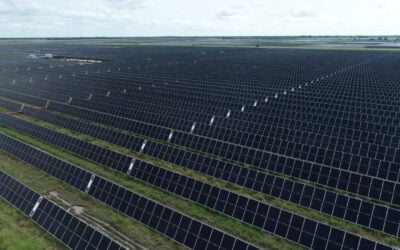
BESS route-to-market (RTM) and optimisation firms in the UK are increasingly looking at a wider variety of contracting mechanisms beyond the revenue-share or ‘merchant’ model, developer-operator Eku Energy told Energy-Storage.news.
The move is overdue with the UK being ‘a bit of a laggard when it comes to RTM contracting structures’ to date, Eku’s chief strategy officer (CSO) Andy Hadland said, speaking to us at the Energy Storage Summit EU 2024 in London last week.
Enjoy 12 months of exclusive analysis
- Regular insight and analysis of the industry’s biggest developments
- In-depth interviews with the industry’s leading figures
- Annual digital subscription to the PV Tech Power journal
- Discounts on Solar Media’s portfolio of events, in-person and virtual
The conventional model for battery energy storage system (BESS) optimisation in the UK has been for optimisers to take a share of the revenues generated; the revenue-share/merchant model.
“We’re now starting to see a fair number looking more seriously at tolls, revenue swaps and more creative and varied structures which I think would be welcomed by the market. It helps us to invest and makes the UK more attractive,” Hadland said.
A toll is an agreement where the optimiser takes on all or most of the risk by paying a fixed fee to the project owner, effectively renting the battery, while a revenue swap is a mix of a toll-like fixed fee with some risk-sharing alongside it.
Such optimisation contracting structures are more common in the US, some parts of Europe and Australia. Akaysha Energy announced a swap deal for a 300MWh project in Australia last year. Tolls have been used widely in the Texas, Arizona and California markets, and it is the model opted for by the Netherlands’ two largest BESS operators SemperPower and Giga Storage.
Asked why the UK lags behind in this regard, Hadland said one big issue is that the revenue stack has moved around a lot and some providers may have struggled to price some of those longer-term contracting options. As Energy-Storage.news has written, revenues in the UK have fallen substantially in the past 12 months, and the mix between ancillary services and energy trading has also shifted.
In general, optimisation firms have focused on improving their technological offering – their AI-based forecasts, etc. – rather than their contractual offering. “Some have had success in the market by focusing on the latter,” Hadland said.
Revenues to recover but ‘not to previous levels’
The stark fall in UK revenues from the highs of 2022 was unsurprisingly a big talking point at the two-day event in London, where Hadland’s colleagues CEO Sandra Grauers Nilsson and director for investment management EMEA Heather Offord spoke on panels (Hadland discussed revenues on a panel at last year’s event).
Like others, Hadland told Energy-Storage.news that market saturation and falling revenues were always expected and that the future still looked good for UK BESS.
Hadland: “We expect revenues to recover but certainly not to the level of a year or two ago. There are more and more services that batteries can provide beginning to open up like balancing reserve and quick reserve. Opening of markets closer to the mid-merit will allow BESS more revenue opportunity, while also providing the ESO (National Grid’s Energy System Operator) with more competition and optionality to manage the system.”
Eku Energy, part of infrastructure investor Macquarie, recently started construction on its first UK projects and is also active in Italy and Australia.






